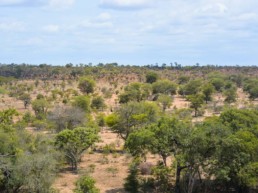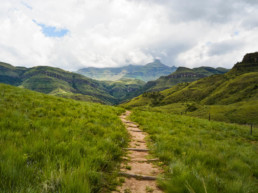I’m not a huge fan of the term ‘bucket list’ but even I can’t deny that there are certain times when its usage is warranted for lack of a better descriptor. An African safari is one of those instances. Often heralded as a ‘once in a lifetime event’ that many dream about for years, a safari can be high on your list yet feel totally out of reach as most of us perceive it as extraordinarily expensive. This can be true – there are an abundance of luxury safari experiences across the continent – however, it doesn’t have to be the case.
South Africa is a popular destination for safari excursions, with most people venturing to the infamous Kruger National Park to get a first-hand sighting of ‘The Big Five’ in their natural habitat. While Kruger is the number one spot for a safari in South Africa, there are many game parks and reserves scattered across the country including Addo Elephant Park, Pilansberg, Kgalagadi, Hluhluwe Imfolozi and Shamwari Game Reserve that offer similar game viewing experiences.
For many of us, traveling to Africa’s most southern country is an adventure in and of itself and most visitors making that trip can’t fathom one without a safari in theri itinerary. Though, a lot of travelers to South Africa aren’t aware that you have the option of self-drive safaris in many of the country’s game parks including Kruger, which provides a varied and more economical experience from that of a private game lodge. Over a month long road trip in South Africa and other visits to the country, I’ve experienced both ends of the Kruger safari spectrum. I’ve gone the self-drive route and stayed both on the Kruger grounds and at a B&B just outside its gates but I’ve also stayed at two lodges on private game reserves. While I’ve thoroughly enjoyed both experiences, they each have their own merits and drawbacks.
I’ve compiled a detailed overview of both a self-drive and private game lodge safari experience, along with pros and cons for each to help you choose the right option for you.
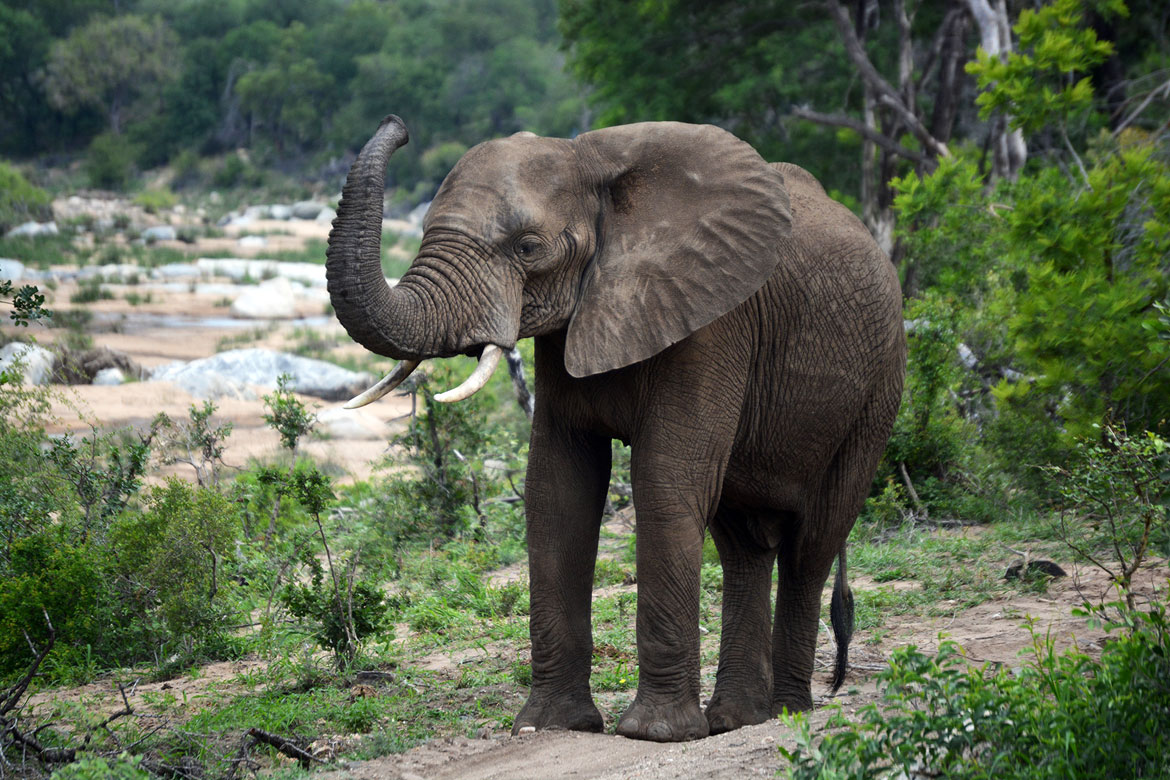
Kruger Safari – Self-Drive:
Kruger is one of South Africa’s national parks, a network of 21 sprawling parks that are scattered throughout the country. As it’s government owned and operated, Kruger is open to everyone. Anyone can drive into the park, where they’ll pay the set conservation fee (~25USD/person/day), and be able to drive around the expansive grounds while the gates are open (between 4:30-6am and 5:30-6:30pm depending on the season).
While it may not be top of mind for international visitors, a self-drive Kruger safari is a popular option for local South Africans, who know how to do it best and enjoy the do-it-yourself approach.
The Upsides:
Rent your own car
Renting a car can be relatively inexpensive in South Africa, and many rates include all of the insurance you’ll need. Airports near Kruger such as Nelspruit and Hoedspruit both have car rental agencies on site, and many safari-goers opt to drive themselves from Johannesburg’s OR Tambo airport. There’s no off-roading in Kruger and the main roads are paved so you don’t need a hefty SUV or 4×4 vehicle – an economy sized car will be fine. Further, many international travelers choose to experience South Africa on a multi-week road trip so they already have a car to use within Kruger.
Stay onsite
Kruger has an extensive offering of lodgings within the park across several rest camps and satellite camps dispersed throughout, with a wide array of options ranging from camping to safari tents to luxury cottages. And they’re all enclosed by electric fence, so you don’t have to worry about large predators sneaking up on you. Alternatively, you can stay offsite in one of the many small towns that dot the Kruger border, though, in my opinion, it’s not as exciting as staying right in the middle of nature.
Huge area to explore
Kruger is enormous: nearly 20,000 square kilometres stretching across two states and spilling over into Mozambique. Driving from one end to the other would take upwards of fifteen hours, so while it makes sense to stick to a certain area, there is so much opportunity to explore the various terrains. There are nine entrances into Kruger depending on what section you’re closest to, making it easy to incorporate a Kruger safari wherever you are in eastern South Africa.
Another option to maximize your Kruger self-drive safari is to hit up different rest camps during your time in the park. This allows you to cover more ground and visit different regions across the park, which are known to attract specific wildlife. Your drive from one camp to the next becomes your safari for the day, and ensures that you avoid backtracking along the same roads.
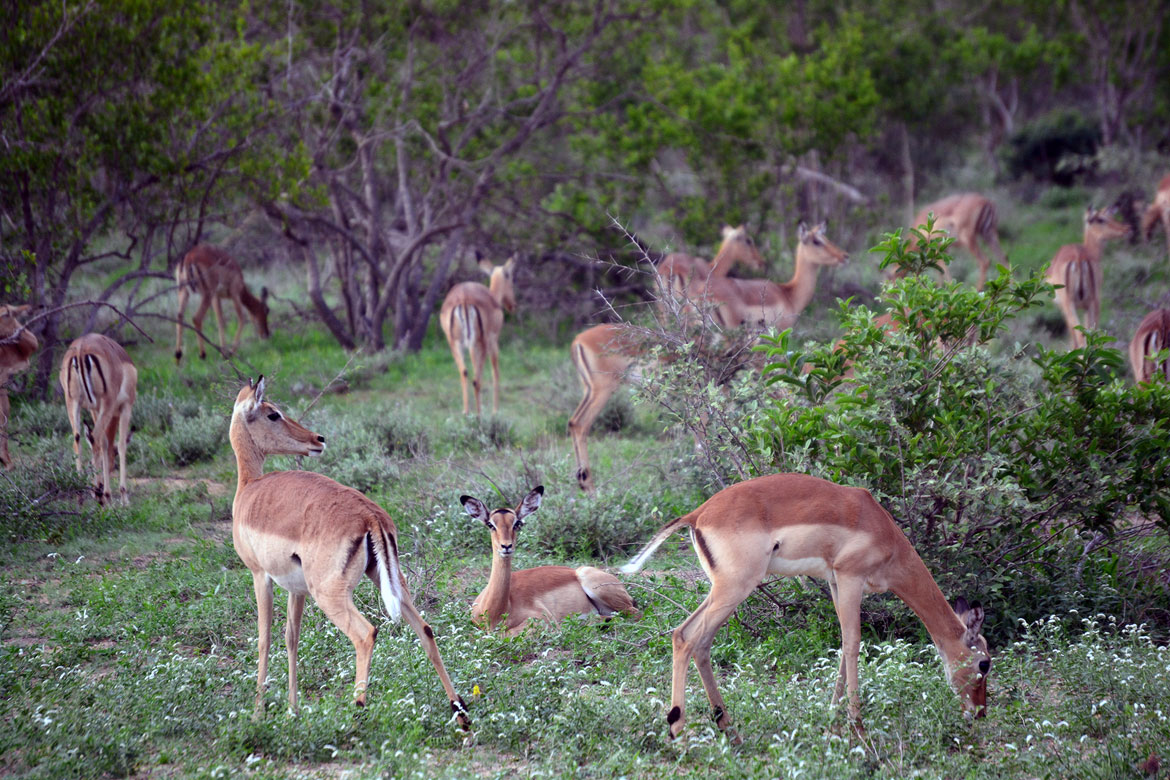
Do what you want
Opting for a self-drive safari gives you the freedom to determine your own route and decide how long you want to be out each day. The rest camps often provide information on recent sightings and you can follow along on social media if you’re keen on spotting a more elusive animal. The other benefit of making your own schedule is that you have total control over how you spend your days. If you want to get up at the crack of dawn that’s cool, or if you’d prefer to sleep in and have a more low-key day or check out a nearby town instead, that’s also fine. The grounds of the main rest camps are quite nice and several including Lower Sabie, Skukuza and Orpen have swimming pools on site, which are popular during periods of high heat.
Less expensive
Going the self-drive safari route can be considerably more cost effective than a private game lodge. The range of lodgings within Kruger is extensive and the nightly price varies significantly from 240 Rand ($18 USD) for camping to 5,000 Rand ($388 USD) for a self catering lodge that accommodates ten. If you’re looking for something in between like a safari tent or bungalow, you can expect to pay between 600 and 2,000 Rand ($46 and $155 USD) per night. On top of this, guests are also required to pay a conservation fee (328 Rand or $25 USD per person per day) and a 1% community fund amount on your total lodging amount, which can add up, but often clocks in quite a bit below the average rates for a full service lodge.
Make your own food
All of the rest camps within Kruger feature cooking facilities, whether shared in a communal area or inside each unit. Most lodging options have a braai, a charcoal barbecue, which is by far the most popular cooking option for those staying on site. Though the electric fence perimeters keep out dangerous animals, others like vervet monkeys and baboons may smell your dinner and loiter around hoping for some scraps. Several of the larger rest camps in Kruger have restaurants on site, giving visitors the option of eating out instead of cooking.
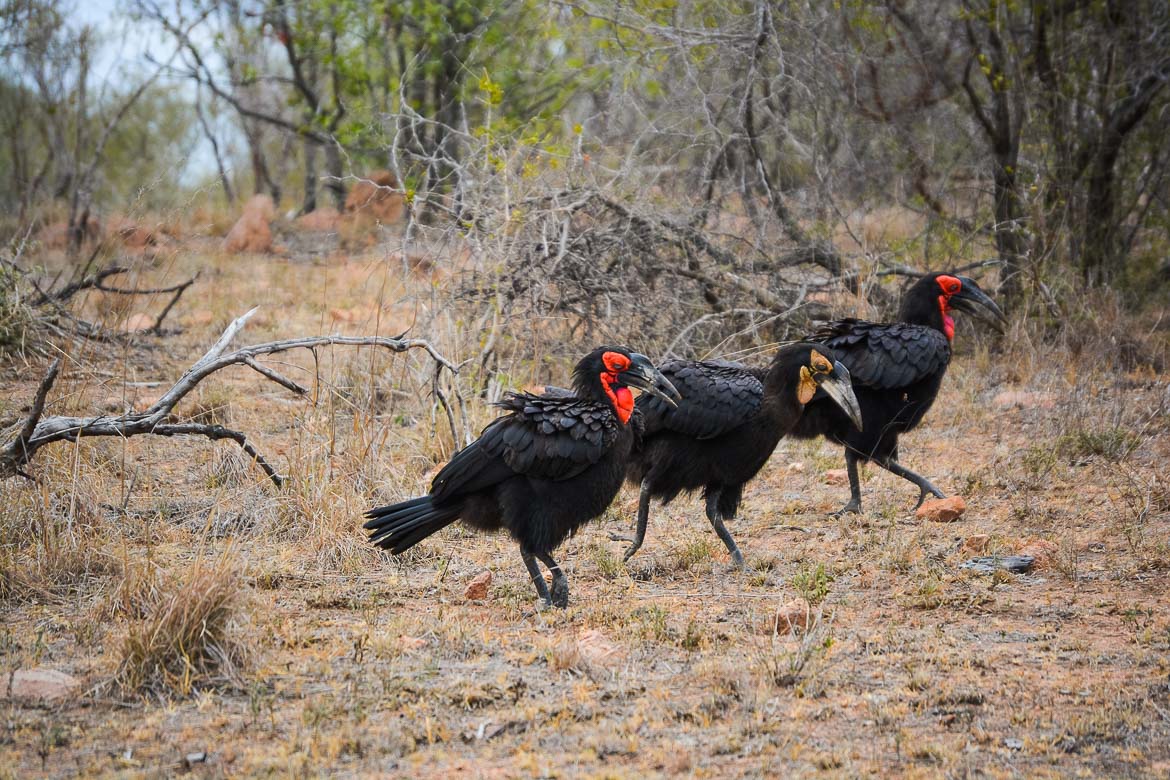
Greater sense of accomplishment
When you’re off on your own DIY safari there’s a greater sense of adventure. There’s nothing quite like stumbling upon a herd of elephants or a tribe of lions when you’re on your own, and your first real wildlife sighting is exciting. While for some it may be tedious, keeping a constant lookout on your drives for animals hidden in the brush or trees adds to the experience, and makes the discovery that much more rewarding.
Join a Kruger safari
The Kruger rest camps offer sunrise, sunset and/or nighttime safari drives that you can join if you’re staying on site for about 400 Rand ($31 USD) per person. These drives are in large open air vehicles and driven by experienced guides. During most of these drives, only official Kruger safaris are allowed on the roads as the gates are closed to outsiders, making it a truly unique experience. Also on offer are safari walks led by expert trackers, which will set you back about 500 Rand ($38 USD) per person. Alternatively, you can arrange a safari by a private company. Often these are done in smaller open air vehicles during gate hours.
The Downsides:
It can be busy
South Africans love to spend time in nature whenever they have the opportunity. Their outdoorsy inclination means that you’ll often see more locals doing a self-drive safari, while more international safari-goers prefer the luxury lodge approach. This means that given the time of year, many of South Africa’s national parks can become extremely busy. During national and school holidays, the roads in Kruger can become quite congested and the lodgings can book up months in advance, making it a bit chaotic. Alternatively, private game lodges often are smaller in scale with a limited number of rooms. Even when they’re filled up, it still doesn’t feel too busy.
Photo difficulties
Though I’m personally very happy for car windows when encountering lions on a self-drive safari, it does make it more difficult to get that perfect shot. Often there can be glare off of the windshield, dust and grime on the windows, and other cars in the frame. Also, you have to stick to the designated roads and paths within Kruger meaning that you can’t go off-roading into the bush, which is where many animals hide out or dart to when they see a car. That’s not to say you can’t get excellent photos when you’re driving within Kruger, but it does add an extra level of complexity. If you want to go the self-drive route but want to be able to focus on animal photography, you can always take a safari within the park as described above.
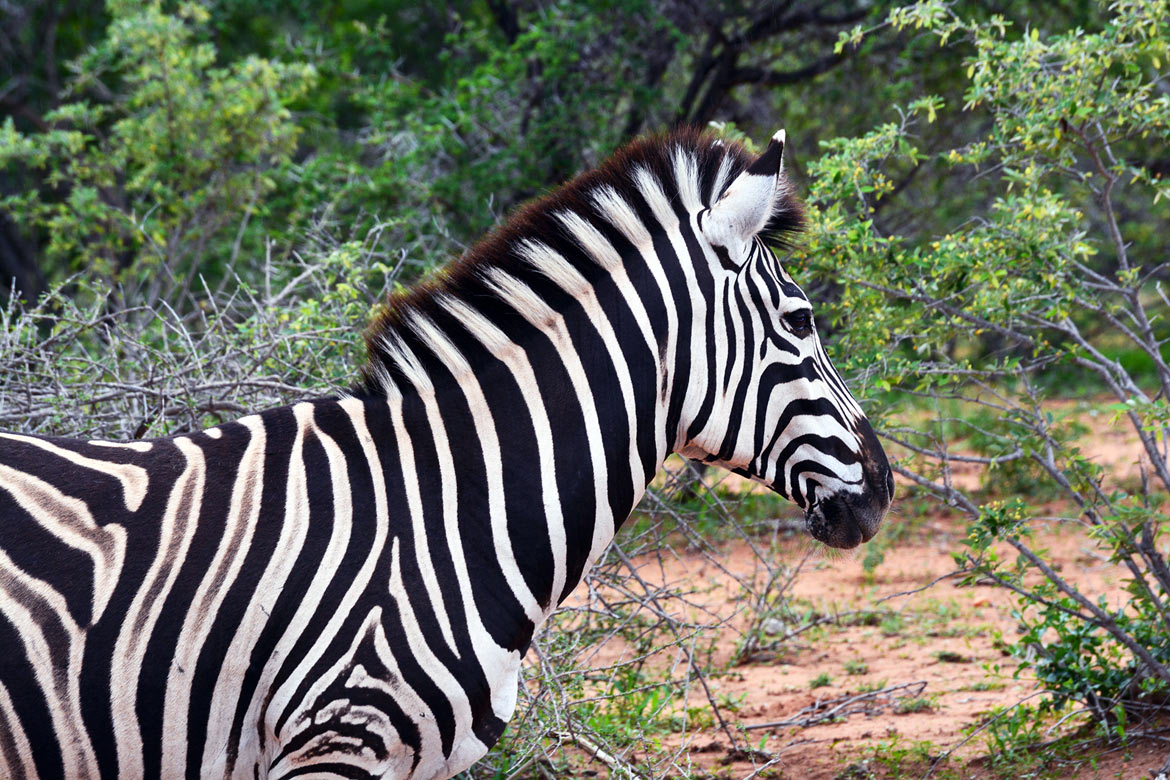
Lack of expertise
Most of us embarking on a safari don’t have expert tracking skills or a ton of knowledge pertaining to the local wildlife. This not only makes the ‘find’ more difficult, it also brings with it the inevitable “what am I looking at?” It is certainly exciting to discover animals on your own even though they can be few and far between, but it can be a bummer when you have no idea what animal you’ve spotted. Stores around Kruger sell safari animal guides with small pictures of all the ones that can be found within the park, giving some much needed guidance on what you’re seeing.
No guarantee what you’ll see
As I’ve said, Kruger is massive. There’s a ton of terrain far from the roads and trails that’s inaccessible to visitors, so the vast majority of animals within the park go unseen. While there’s no certainty of what you’ll see in a private lodge safari either, it’s more of a crapshoot for self-drivers, in my opinion. During my last Kruger self-drive staying at Orpen rest camp, we talked to people staying in the southern section around Lower Sabie at the same time as us who had vastly superior sightings than we did – lots of lions, a couple of leopards and a cheetah with her young cub, while we didn’t see any big cats.

Grounds close early
Unless you’re paying to take one of the official safaris offered by the park staff, all vehicles must be off the road by the time the gates close. This applies even if you’re staying in one of the rest camps. Though you probably wouldn’t be comfortable driving yourself around in the dark anyway, many of the big game are most active at dusk. This is a perk of staying at a private lodge, where safaris can last well into the evening.
Kruger lodgings are rustic
While staying within Kruger National Park is truly a unique experience, the accommodations for the most part are no-frills. The lodgings that I’ve encountered throughout South Africa’s national parks have been comfortable and highly functional, but a bit dated and certainly not luxurious. I don’t mind more of a basic homebase while in Kruger and I do enjoy the rustic vibe, though others might be disappointed if they’re envisioning something more high-end.
Kruger Safari – Private Game Lodge
For many planning a first time trip to South Africa there’s an entrenched idea that a safari has to cost as much as a small car. What we’re often exposed to are the extremely opulent private lodges that take luxury to the next level – infinity pools overlooking waterholes and twinkling lights everywhere. Many less luxurious and less expensive options exist, most of which still provide an excellent experience. Best to do your research well in advance to find a private game lodge that’s well suited to you.
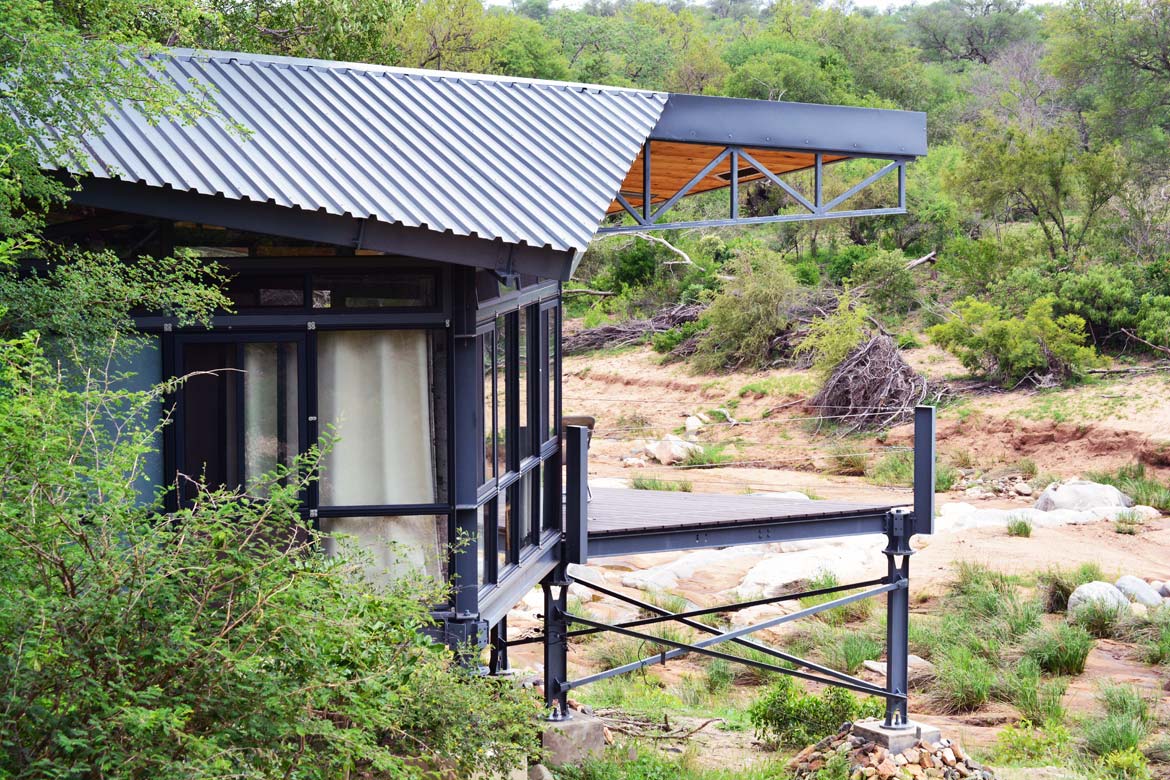
The Upsides:
Transfers offered
Many private lodges offer transportation to and from nearby airports and cities, eliminating the need to rent a car. Though transfers are often an added cost, they can be very convenient for travelers wanting an end-to-end experience. Pickups from Nelspruit and Hoedspruit airports are a popular option, while many safari packages will pick up guests at hotels in Johannesburg and deliver them right to their lodge.
Expert guides
Having a knowledgable and experienced guide is a major advantage of a private game lodge. These local experts have a tremendous amount of information about the vast array of plants and animals abound, which enriches any safari experience. Guides are also your best bet for actually encountering elusive wildlife as they have tracking skills that they put to good use. Further, they often radio with guides from nearby lodges when something interesting is spotted, so that they have ‘eyes’ throughout the region. There have been many times during my lodge safari experiences when our guides are tipped off about something and drive on a mission to get us there, like when a young male lion challenged the pack leader for its territory – something you definitely don’t see every day.
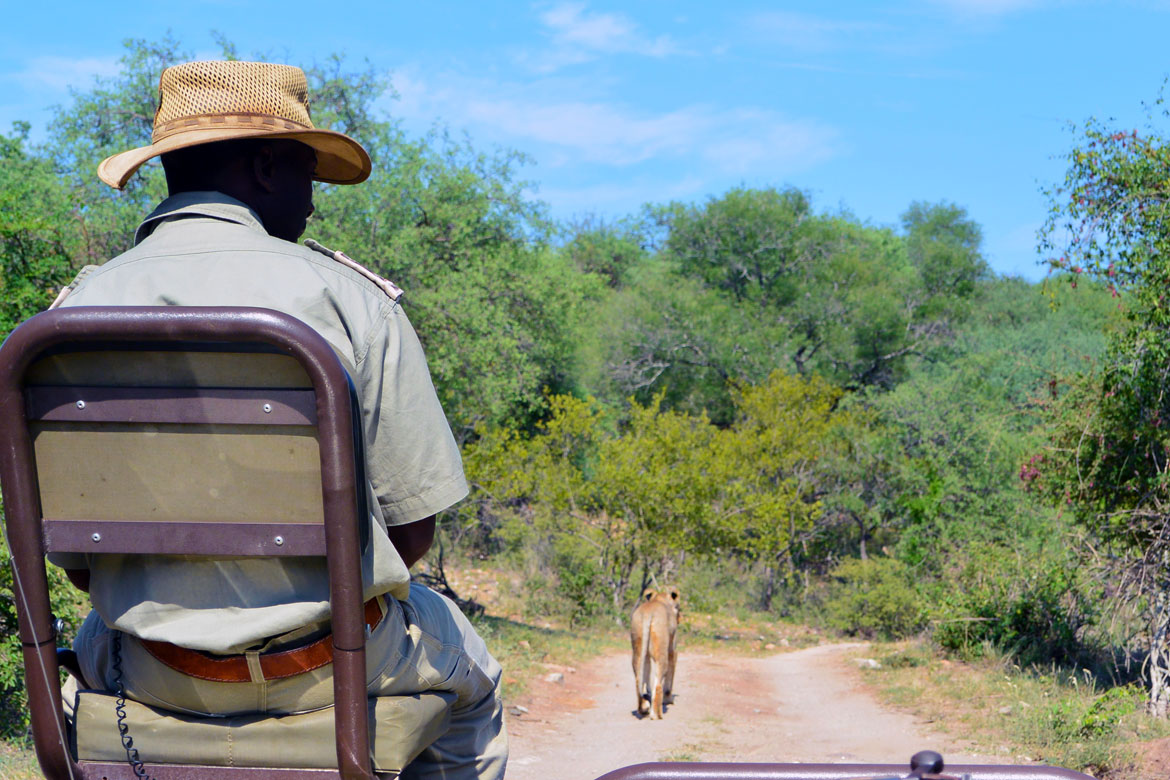
Better vantage points
Experienced safari guides know how to make the most out of your animal sightings, allowing you to see them up close but also careful not to encroach on their space. In most private game reserves safari vehicles can venture off the road, which can often provide a glimpse of animals that they’ve been tracking that can’t be seen from the trails. Safari guides are used to having photographers on board, both amateur and professional, so they ensure they get you the best viewpoints. Sometimes they’ll sit for awhile in one spot and then reposition the vehicle to get a different perspective.
Less busy
There are often multiple lodges situated in a private game reserve. While you technically share the space, the area is usually so large that you’re rarely around another safari vehicle unless there’s something interesting happening that’s been broadcasted over the radio. When you’re traversing the terrain looking to spot something, you often feel like there’s nobody else for miles – something that’s a rarity on a self-drive safari. Additionally, based on their size and design, most lodges feel intimate and secluded even during peak season.
Food included
Meals at full service lodges are typically included in the nightly rate, which should be considered when evaluating the full cost of a Kruger safari. While the quality across various lodges can range from basic to five-star dining, food has been a focus at all of the private game lodges I’ve stayed at. If meals are included, you can often expect a small snack of fruit, bread and coffee at the crack of dawn before your morning safari, a full breakfast after returning to the lodge, a late lunch before embarking on the second safari, and a large dinner awaiting you when you’re back.
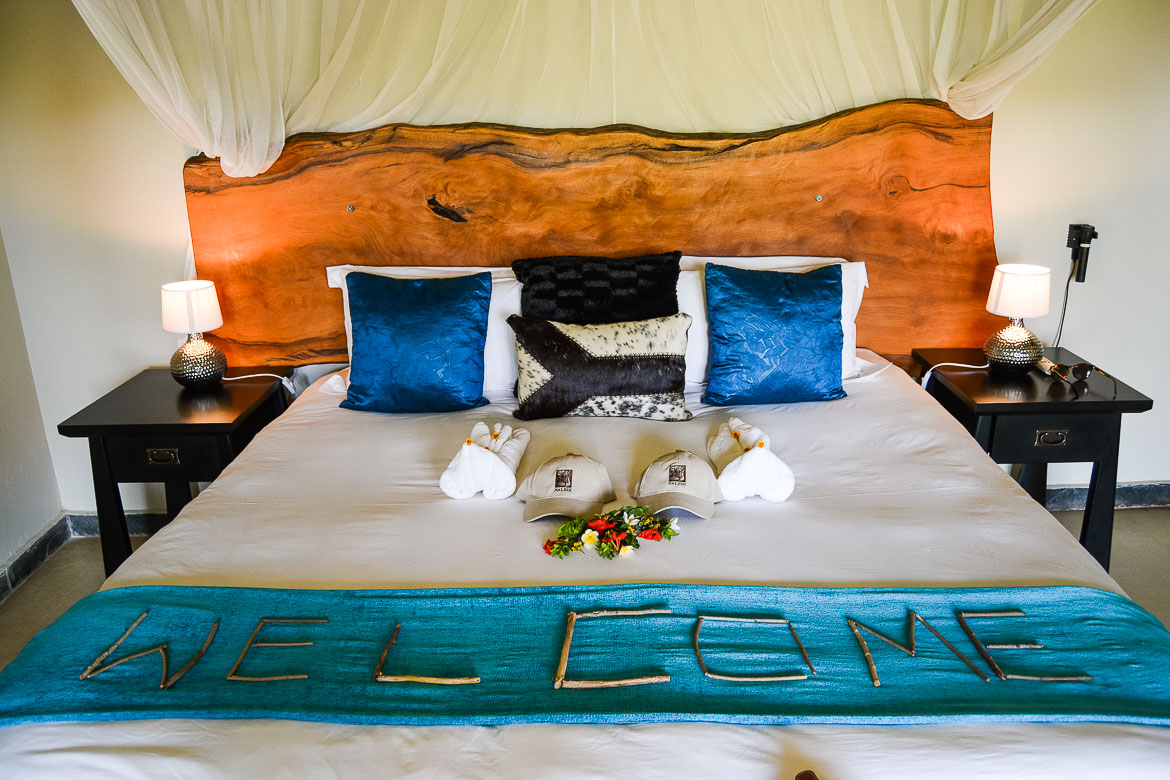
Hospitality
As private lodges compete for visitors, they often offer a high level of hospitality. Throughout my experiences at full service lodges, staff have consistently gone above and beyond to make everyone’s visit exceptional. From dining under the stars to chocolates on the pillows to epic sundowners, lodges aim to provide unparalleled service and make your time in Kruger something you’ll never forget.
The Downsides:
More expensive
There’s no denying that you can do a self-drive safari cheaper than a private lodge, though there are a lot of factors to consider when evaluating how much each will cost you. After factoring in conservation fees, lodging cost, food, a-la-carte safari drives, and a car rental, a self-drive option can cost a few hundred dollars a night. And while you can certainly blow the bank on a private game lodge, there are others like N’Kaya, Umkumbe, Gomo Gomo and Africa On Foot that fall under the more affordable category, though they book up well in advance.
Less control
The schedule at most game lodges is fairly structured, with two long game drives each day and usually a choice of activities midday including game walks, bird hides, or just relaxing by the pool. While you can always opt to skip a game drive if you want to sleep in, you’re pretty much confined to the lodge when not out on safari. Having a structured schedule might be appealing depending on your personality but it can drive others mad.
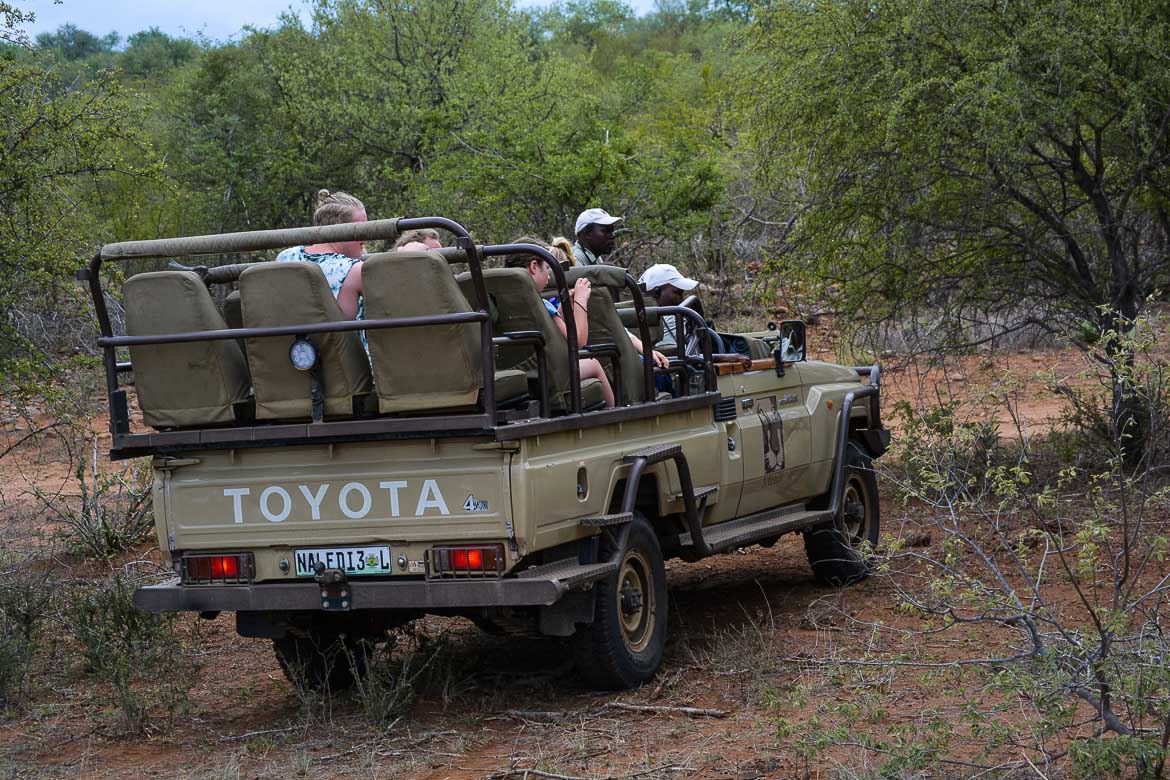
Might be fenced
Private game reserves exist on the periphery of Kruger and are part of the Greater Kruger National Park. Each day your game drives will take you through the private game reserve – not into the national park that’s accessible for self-drivers. Additionally, some game reserves have open fences with Kruger, meaning that animals traverse back and forth into the public and private areas, though others are fenced. Fenced game reserves contain animals within the reserve, so guides and trackers know what’s around. While you have a better opportunity of seeing everything on your checklist in a fenced setting, there’s not much room for surprise. Some people prefer fenced reserves while others don’t, so if you have a strong viewpoint on either then do your research beforehand.
Can’t pick your safari companions
While I can say that I’ve never encountered anything but lovely fellow travelers at the lodges I’ve stayed in, you never know who you might end up with. You spend a lot of time with the other guests throughout the day from communal meals to eight hours on a safari vehicle together, so if there’s somebody you just can’t stand, it’s hard to escape them. This isn’t a problem on a self-drive safari, unless that annoying individual is your travel companion. But that’s your own fault.
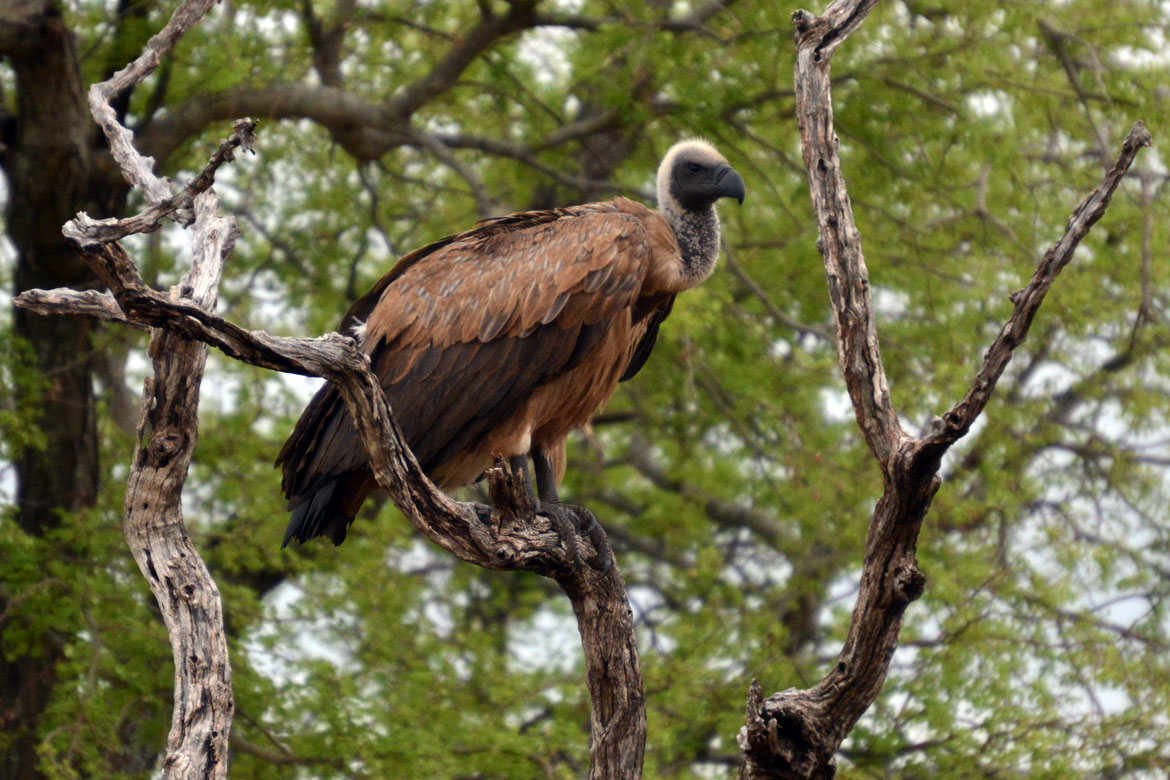
Which Kruger Safari Should You Do?
If you’re adventurous and like to be independent – Self-Drive Safari
If eating great food is important to you – Private Game Lodge
If your time is limited – Private Game Lodge
If you’re more comfortable in basic accommodations – Self-Drive Safari
If you’re going during peak season – Private Game Lodge
If you’re on a strict budget – Self-Drive Safari
If you’re going in rainy season – Private Game Lodge
If you don’t like being doted on – Self-Drive Safari
If you’re a photographer – Private Game Lodge
If you’ve been dreaming about this experience for a long time (and have super high expectations) – Private Game Lodge
If you have ample time – do both!
The Best of Both
Stuck on the self-drive versus private game lodge debate? A great way to experience both ends of the Kruger safari spectrum is to combine them by spending a few days doing each. If you’re flying in and out of Kruger, you can arrive at either Nelspriut or Hoedspruit airports and rent a car. The area near both airports have an abundance of private lodges and rest camps within the park boundaries, allowing you to minimize your transport between the two.
There are differing opinions on what order you should do them in, though. Many argue that leaving the self-drive for last allows you to pick up information and skills from your expert guides so you have a better understanding of what you’re doing, and what you’re looking at, when you’re on your own. However, in my experience, I’ve often had more sightings when in a private game reserve, so I like to save that for the end of my Kruger stint otherwise I’d be a bit disappointed not seeing as much after. Also, the lodges that I’ve stayed in have been so lovely and relaxing that leaving them to go just a little ways away would be a bit of a bummer. But to each their own.
Kruger Safari Self-Drive versus Private Game Lodge photos by Lauren Barth & JP Bervoets
Make your next trip the best one.
Departful is a full service travel agency creating truly exceptional travel experiences that are 100% personalized to you. Wherever you’re going, whatever your interests, we help you plan the perfect trip.
Lauren
Lauren Barth co-founded Departful in 2012 and is the Managing Director of Departful Media. Since then she has worked between North America and Europe and has published content in partnership with a variety of tourism boards and businesses based around the world. Lauren is currently based in Toronto, Canada.


